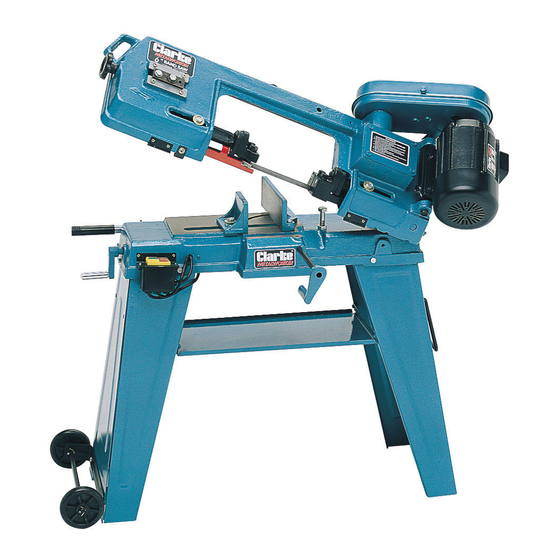Clarke Metalworker CBS45MD Bedienings- en onderhoudshandleiding - Pagina 12
Blader online of download pdf Bedienings- en onderhoudshandleiding voor {categorie_naam} Clarke Metalworker CBS45MD. Clarke Metalworker CBS45MD 19 pagina's. 6” (152mm) bandsaw

2. BLADE GUIDE ASSEMBLY ADJUSTMENT
The Metal Cutting Bandsaw is equipped with two adjustable blade guide
assemblies, so that the blade guides may be individually adjusted to
accommodate various widths of workpieces.
To effect the most accurate cut and prolong the life of the blade, the blade
guide assemblies should be adjusted to just clear the piece to be cut without
impeding the lowering arm. This is carried out as follows:
1.
Place the workpiece in the vice of Bandsaw and clamp tightly.
2.
Adjust blade guide assembly to the desired position by loosening the securing
bolts (items K and E) and positioning the guides as required (see note above).
3.
Tighten the securing bolts.
3. ADJUSTING BLADE TENSION
Turn the Blade Tension Adjusting Knob, (item C), clockwise to increase tension,
anticlockwise to decrease.
The knob is provided with a spring lock to ensure it does not move during use
or whilst the bandsaw is being moved.
The blade needs to be tight enough to give a straight cut without allowing it
to wander or slip, but must not be too tight so that it is rigid, there must be a
certain degree of flexibility.
The correct tension is 700-900kgs, as measured with a blade tension gauge.
To tension without a gauge, slacken off adjuster so that the blade sags, then
screw in again (clockwise) until all sag has been eliminated. Finally, turn the
adjuster a further two complete turns. See 'Maintenance' for blade installation
and tensioning a new blade.
If the saw is not being used for some time, eg. at the end of a working day, we
recommend that you relieve the tension on the blade.
4. BLADE SELECTION
1.
Special Note: A 14 tooth per inch general use blade is supplied with The
metal cutting Bandsaw (see Specifications). Additional blades in 14 and 24
tooth sizes are available from your local dealer.
2.
The choice of blade pitch is governed by the thickness of the work to be cut
- the thinner the workpiece. the more teeth are used.
A minimum of 3 teeth should be in the workpiece at all times for proper
cutting.
3.
If the teeth or the blade are so for apart that they straddle the work, severe
damage to the workpiece and to the blade can result.
12
